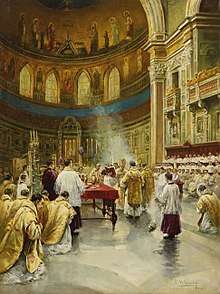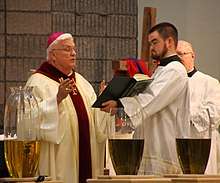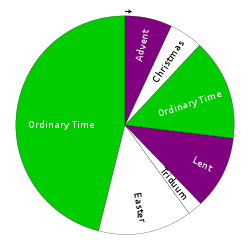Chrism Mass
The Chrism Mass is a religious service held in Roman Catholicism, Lutheranism, and Anglicanism.[1][2]

Holy Thursday is notable for being the day on which the Chrism Mass is celebrated in each diocese. The Chrism Mass is one of the most solemn and important liturgies of the liturgical year. Usually held in the diocesean cathedral, it is generally held on the morning of Holy Thursday, but may in some dioceses take place on another day during Holy Week.[3] It is often the largest annual gathering of clergy and faithful held in most dioceses.[4] In some dioceses, attendance is sufficiently significant that, due to limited seating, tickets are distributed to parishes.[5] The Mass is a celebration of the institution of the priesthood with Jesus' words at the Last Supper, "Do this in memory of me."[6] During the Mass, those present are called to renew their baptismal promises; priests/ministers and deacons also reaffirm their ministry by renewing the promises made at their ordination.[1][4][7]
The Mass takes its name from the blessing of the holy oils used in the sacraments throughout the year, which are then given to priests/ministers to take back to their parishes.[8] The Rite of Reception of the Oils by representatives of the diocesan parishes is a sign of each parish's unity with the Bishop and the diocesan Church.[9] Whenever the holy oils are used, the ministry of the bishop who consecrated them is symbolically present.[10] The oils distributed are meant to last all year, although extra oil is also blessed during the Mass and is kept at the cathedral as a reserve if a parish runs out.[11]
The service is a 1967 restoration of the rite recorded in the early 200s by the historian Hippolytus who writes of a ceremony taking place during the Easter Vigil at which two holy oils were blessed and one was consecrated. In the fifth century, the ceremony of the oils was transferred from the Easter Vigil to Holy Thursday during a special Mass for that purpose, distinct from the Mass of the Lord's Supper. The change took place, partly, because of the large crowds that assembled for the Easter Vigil, but also to emphasize Christ's institution of this ordained priesthood at Holy Thursday's Last Supper.[12] In the decree renewing this rite Pope Paul VI said:“The Chrism Mass is one of the principal expressions of the fullness of the bishop’s priesthood and signifies the closeness of the priests with him.”[12]
The Holy Oils are:
- Chrism – used in the sacraments of Baptism, Confirmation and Holy Orders, as well as for the consecration of altars and the dedication of churches.[13]
- the oil of catechumens – also used in the sacrament of Baptism, and
- the oil of the sick – used in the rite of the Anointing of the Sick

The oil of the catechumens and chrism are used on the upcoming Holy Saturday at the Easter Vigil, for the baptism and confirmation of those entering the church.
While the Oil of the Catechumens and the Oil of the Sick, are simply "blessed," the Sacred Chrism is "consecrated,". Holy chrism is a mixture of olive oil and balsam, an aromatic resin. Balsam is poured into the oil, which gives it a sweet smell intended to remind those who encounter it of the "odor of sanctity" to which those who are marked with it, are called to strive. The bishop breathes over the vessel containing the chrism, a gesture which symbolizes the Holy Spirit coming down to consecrate this oil, and recalls the actions of Jesus in John 20:22, when he breathed on the apostles and said, "Receive the Holy Spirit..." The priests concelebrating the Mass extend their hands toward the vessel containing the chrism and say the prayer of consecration silently as the bishop pronounces it over the chrism.[4][12]
Anglicanism
The 1979 BCP (p. 307) calls for chrism to be consecrated by the bishop. This may be done when the bishop is present in the parish for Confirmation. In many dioceses, the consecration of chrism by the bishop may be done at a service of reaffirmation of ordination vows during Holy Week. Similar to the Roman Catholic ritual, during the Chrism Eucharist, the Bishop will bless the oils used throughout the next year for baptisms and healing. In addition, the Bishop and clergy in attendance will reaffirm their Ordination Vows.[2]
References
- How is oil used in worship?. Evangelical Lutheran Church in America. 2013. p. 2.
This service, also called a Chrism Mass, is held during Holy Week and presided over by a synodical bishop. At this unique liturgy, the blessing of oil is coupled with a renewal of vows for rostered leaders. The traditional day for this service is Holy Thursday (when some traditions believe the first ordinations took place).
- "Chrism Mass 2017", The Episcopal Diocese of Tennessee
- Saunders, William. "What is the Chrism Mass?", Arlington Catholic Herald, March 23, 2017
- Jalbert, Jason. "Chrism Mass", Diocese of Manchester (New Hampshire)
- "Chrism Mass 2017", Diocese of Green Bay
- "What is the Chrism Mass?", The Monitor, McAllen, Texas April 11, 2017
- "Chrism Mass", Cathedral of St. Mary's, Diocese of Lafayette-in-Indiana, April 4, 2017 Archived 13 April 2017 at the Wayback Machine
- Chatelain, Kim. "Chrism Mass to be celebrated at 10 a.m. at St. Louis Cathedral", Times-Picayune, April 11, 2017
- "Reception of the Holy Oils", USCCB
- "Chrism Mass celebrates priesthood, allows for blessing of oils", the Brownsville Herald, April 12, 2017
- Labbe, Mark. "Sacred Oils Prepared for chrism Mass", The Boston Pilot, April 7, 2017
- "Chrism Mass", Catholic Review, Archdiocese of Baltimore, March 27, 2008 Archived 13 April 2017 at the Wayback Machine
- "Chrism Mass 2017", St. James Cathedral, Seattle, April 6, 2017
